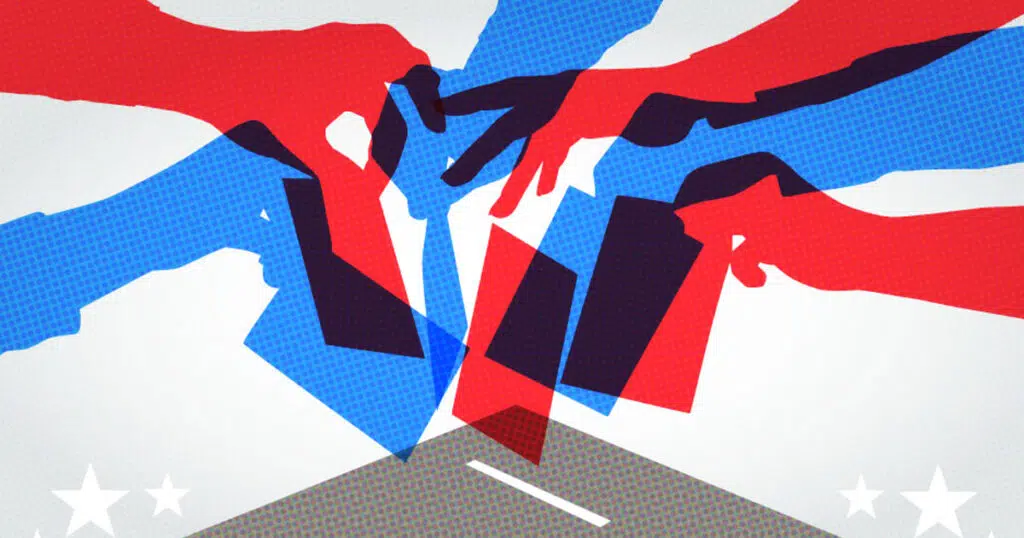
The Lion, the Witch, and the Lying Left-Wing Pollsters
Famous British Prime Minister Benjamin Disraeli famously once said, “There are three types of lies, lies, damn lies, and statistics.” The same could be said about most polls and pollsters in this hyper-political era where very few samples of data are presented by individuals and institutions that don’t have an agenda.
Despite a new narrative in the mainstream media that the Democrats are doing much better in the polls than at any time in the last year as we head into the mid-term elections, a careful and more detailed look at all the information suggests this election cycle should be a massive Red Wave for Republicans.
Here are the facts.
There are a number of recent polls, particularly at the state level in states like Ohio, Pennsylvania and Arizona, showing Democratic candidates close or ahead against their Republican counterparts in Senate races. Energy prices have fallen, Biden was able to get some larger pieces of legislation such as the so-called “Anti-Inflation Act” passed, and the overturning of Roe v. Wade has impacted the political landscape as well. Biden also recently helicoptered in some money to his young progressive base with the student-loan giveaway. The left certainly has gotten some recent breaks that have helped the party on a national basis. Still, much of the so-called recent success that the Democrats think they have had is heavily overstated, and polls are still very misleading for a number of reasons that I will get into now.
The first problem with the current polls is they don’t account for the heavy enthusiasm gap between the right and left entering this election cycle that still exists even since the Supreme Court overturned Roe v. Wade. Polls are obviously done of likely voters, or at least reputable polls are (yet that isn’t the case with lots of the ones you’ve seen splashed across your TV screen), but this isn’t a presidential election. And since there are a number of indicators showing the right is still the much more motivated side, it remains likely that conservatives are more likely to show up to the polls on election day.
A recent September Economist poll shows that 67% of Republican voters said they will definitely vote in the mid-term elections, while the same poll showed only 60% of Democratic voters said they will definitely vote in the mid-terms. A 7% gap in enthusiasm in likely voter turnout would obviously make a huge difference in the electoral outcome. Trump also brought a large number of independents and new voters into the Republican Party who still don’t necessarily identify primarily as Republicans.
The coalition that the Democrats used in 2020 is also nowhere near as strong right now. Specifically, the massive turnout in the black community and with suburban women isn’t likely to be as strong in this election cycle. Black turnout in key swing states such as Michigan and Pennsylvania, where turnout in Detroit and Philadelphia was critical for the left, was particularly important for the Democrats in 2020. But no community has been harder hit by inflation than the black community in the inner city, and crime is out of control in nearly all of these Democrat-run urban areas as well.
With crime out of control and inflation causing significant pain in this community, it is almost certain that turnout levels for the left in the black community in 2022 will not be close to what they were in 2020. A recent Gallup poll also showed Biden’s approval rating in the black community at 67%, which is a 20-point drop from the beginning of his administration. Obama’s approval level in the black community never fell below 75%.
The left is also not doing as well with suburban women, a key constituency that helped them in both 2018 and 2020. Many women in the suburbs are concerned with crime and they don’t like what Democrats are trying to force down their throats in public schools. Glenn Youngkin’s victory in the Virginia governor’s race last year was a good recent example of this trend. Some of these voters are also motivated by the overturning of Roe. V. Wade, but Republican’s aren’t likely to lose suburban women by anywhere near the almost 20 point gap that Trump lost this demographic in 2020.
The second problem with the polls is they fly in the face of the fundamentals. Democrats seem to be at their strongest point right now, and much of the left’s bump in the polls won’t likely be sustainable going into the mid-term elections for a number of reasons. Oil prices have fallen over 20% in the last several weeks primarily because of the weakening US and global economy and the rising dollar, but energy prices are not likely to fall significantly from current levels given supply constraints, such as this Administration’s refusal to open up new drilling or pipeline projects. Four-dollar gas may look cheap to consumers right now because gas prices were over $5 a gallon just a month ago, but $4 dollar gas is still historically expensive, and consumers won’t feel the same way about gas prices in a month that they do know after the 20% drop.
Prices also remain very high across the board as the recent Inflation and price index report showed. Food, auto, electronics, and many other prices remain at extremely high levels. People see and far more important fell the impact of high prices every day. A recent poll still showed Inflation is the number one issue with most voters, with 30% of voters saying high prices is the most important issue in the upcoming elections. 30% was down from 37% several months ago, but this number is still high. Abortion came in at 22%, still much lower than inflation. The overwhelming majority of Americans also still think the country is headed in the wrong direction, always a bad sign for the party in power.
Also, none of Biden’s recent legislation or even his recent actions on student loans is likely to make a big difference on election day for several reasons. The left-leaning Congressional Budget Office has already said the so-called Inflation Reduction Act will have no impact on Inflation in the short term. Worse for Biden was the optics of his throwing a party celebrating the signing of that bill on Tuesday – a day when a government report showing rising inflation of 8.3 percent for August cratered the stock market and triggered some $1.6 trillion in lost capital for Americans.
Let’s not forget the reality is that a reduction of $10,000 in student loan debt will make little to no difference to most people who have significant student loan debt of $100,000, or more. Most younger progressives are still disappointed with this administration on issues such as Climate Change, and a $10,000 giveaway, $20,000 for families, won’t likely be enough to get a significant number younger voters to change their opinion about Biden and the Left right now.
The polls for individual Senate races are also likely misleading as well. Many of the Republican nominees for the Senate are political newcomers like J.D. Vance in Ohio, Mehmet Oz in Pennsylvania, and Herschel Walker in Georgia. Traditional Republicans who almost always eventually support the party nominee, aren’t supporting the party’s candidates yet. The best example of this is in Pennsylvania, where only 73% of Republicans are supporting Oz right now. A recent poll showing that J.D. Vance trails Democratic candidate Tim Ryan 48-39% shows many Republican voters in Ohio, a state that is no longer a swing state, haven’t come home yet either.
This is the main reason some polls show stroke patient and Bernie Bro extraordinaire John Fetterman with a 10-point lead over his Republican rival. Fetterman is a far-left Democrat who supports such absurd positions as banning fracking and releasing nearly a third of all prisoners from Pennsylvania jails, so traditional Republicans are very likely to come home to Oz as the election nears. Many of these political newcomers also have predictably not run particularly strong campaigns so far, but they obviously should get better at campaigning with time. Lifelong members of a political party almost always end up supporting their party’s candidate as the election approaches, and there is no reason to believe this election cycle will be any different.
Polls have undercounted Republicans and Conservatives for years, and this trend only accelerated when Trump came on the political scene in 2015. The reality is that nearly all the long-term trends – the fundamentals – that should hold going into the mid-term elections favor the right. Most Americans think the country is headed in the wrong direction, the enthusiasm gap still favors Conservatives, and Inflation remains the most important issue to most voters.
Senator Schumer recently told a group of Democrats that he believes the left will lose the House but also that the party has a 60% chance of retaining the Senate. The Senate will likely be much closer than the House, but the Republican party remains very well-positioned to take control of both chambers of Congress in this election cycle.



